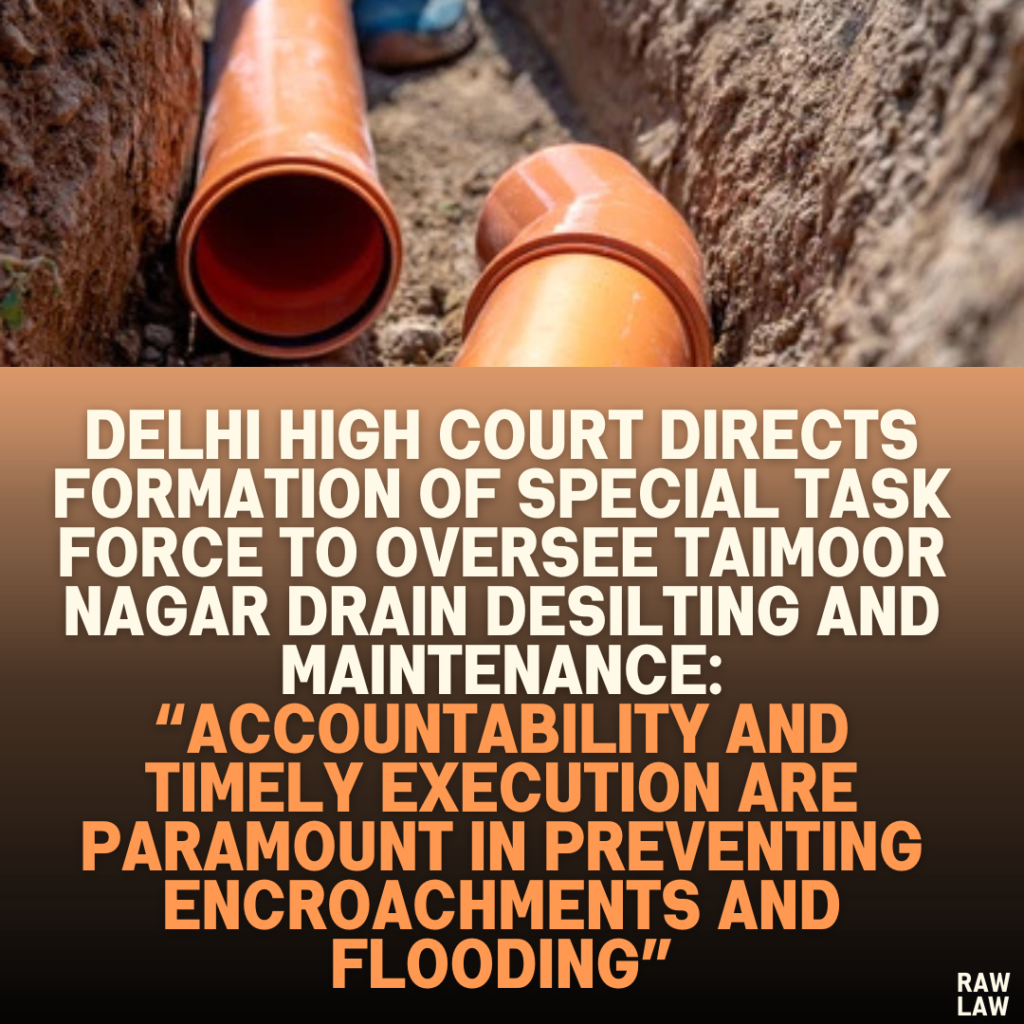Court’s Decision
The Delhi High Court directed the constitution of a Special Task Force (STF) chaired by the Chief Engineer, Irrigation & Flood Control Department (I&FC), to manage the desilting and maintenance of the Taimoor Nagar drain. The STF’s primary responsibilities include ensuring free-flowing drains by removing encroachments, managing garbage disposal, and completing construction activities in a timely manner. The court issued specific timelines for action and emphasized stringent accountability for any non-compliance.
Facts
- Nature of the Petition: The case arose from a writ petition seeking the removal of illegal encroachments along the Taimoor Nagar and Khizarabad drains. Additionally, the petition sought:
- Implementation of the Drainage Master Plan for Delhi (2018).
- Adherence to the Master Plan for Delhi (2021).
- Cleaning and de-silting of the drain up to the Yamuna floodplains.
- Inspection Report: On December 17, 2024, an inspection report detailed the condition of the drain, highlighting encroachments and garbage accumulation that hindered its functionality.
- Preliminary Actions: The STF was initially constituted with key officials from various departments such as DDA, MCD, and DJB, to address these challenges.
Issues
- Whether illegal constructions along the drains could be effectively removed.
- How the desilting, cleaning, and maintenance of drains could be enforced under existing master plans and legal frameworks.
- What measures should be taken to prevent future encroachments and garbage dumping.
Petitioner’s Arguments
The petitioner contended:
- The Taimoor Nagar drain suffers from severe neglect due to garbage accumulation and encroachments, worsening flooding and sanitation issues in nearby residential areas.
- Peripheral drains around low-lying areas such as Maharani Bagh should be considered to address flooding caused by Ring Road overflow.
Respondent’s Arguments
- DDA’s Role: Clarified the composition of the STF and the role of their officials.
- Contractor’s Assurance: The contractor appointed for desilting assured the court of work readiness once GRAP (Graded Response Action Plan) restrictions were lifted.
- Inter-Agency Cooperation: Efforts were highlighted by DDA, MCD, DJB, and other agencies to resolve encroachment and garbage disposal issues.
Analysis of the Law
- Urban Planning Compliance: The court stressed the implementation of the Drainage Master Plan (2018) and the Master Plan for Delhi (2021) as statutory obligations.
- Civic Responsibilities: Agencies such as MCD, DDA, and DJB are mandated under municipal law to ensure proper waste management and prevent encroachments.
- Judicial Oversight: The court emphasized its role in ensuring accountability and coordination among public agencies to protect civic interests.
Precedent Analysis
While specific past cases were not referenced, the court’s decision aligns with the established principles of urban governance and public health, which require municipal bodies to prioritize clean and functional drainage systems.
Court’s Reasoning
- Necessity of STF: The court recognized the complex and overlapping responsibilities of various agencies, necessitating a coordinated body like the STF to resolve disputes and oversee implementation.
- Accountability Measures:
- Directed the STF to execute its responsibilities with clear timelines.
- Mandated detailed status reports to ensure transparency and progress.
- Stakeholder Coordination: The court emphasized cooperation among all relevant stakeholders, including public authorities and private contractors, to achieve tangible results.
Conclusion
- Key Directives to STF:
- Oversee the cleanliness, desilting, and de-clogging of the Taimoor Nagar drain starting January 1, 2025.
- Demolish encroachments and construct boundary walls to prevent garbage dumping.
- Coordinate with agencies such as DDA, DJB, and MCD for timely execution of tasks.
- Specific Responsibilities:
- Construction and repair of the drain wall under the STF’s supervision, with costs shared between MCD and DDA.
- Issue necessary approvals for garbage disposal infrastructure like Fixed Compact Transfer Stations (FCTS).
- Penalties for Non-Compliance: The court warned of strict actions against any agency or individual failing to meet stipulated deadlines.
Implications
- Governance: The decision reinforces judicial intervention in civic matters, ensuring that public agencies remain accountable for urban planning obligations.
- Flood Mitigation: Effective desilting and maintenance of drains could significantly reduce flooding risks in low-lying areas.
- Environmental Impact: The removal of garbage and silt will help improve drainage functionality, contributing to better public health and sanitation standards.
- Judicial Oversight: The case highlights the importance of court-mandated coordination between multiple stakeholders for achieving infrastructural improvements.
The decision sets a precedent for structured and collaborative governance, emphasizing the importance of transparency, accountability, and inter-agency coordination in addressing urban challenges.
